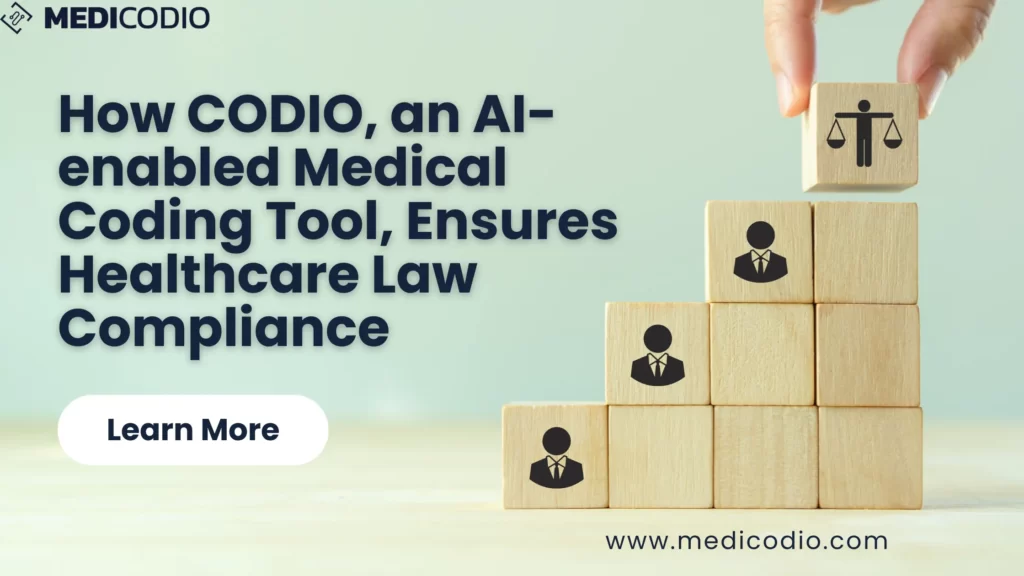“Fraud,” “abuse,” “upcoding,” “unbundling,” and “compliance” are some of the trending terms in the healthcare industry. The government is determined to stop healthcare fraud and abuse and is conducting more investigations. Healthcare providers are worried that they might be investigated next. Healthcare laws and regulations are the backbone of safeguarding patient privacy, ensuring data security, and upholding ethical practices within the healthcare industry. In this blog, we’ll explore the pivotal role played by AI-enabled medical coding tools, particularly CODIO, in upholding these laws and regulations, primarily focusing on its relationship with HIPAA compliance.
Importance of Healthcare Laws and Regulations
Patient privacy, data security, and ethical practices are fundamental in healthcare. These laws and regulations ensure patient information remains confidential and secure while also fostering trust within the healthcare system.
Understanding Medical Coding AI
Medical Coding AI is the use of artificial intelligence (AI) to automate and streamline the medical coding process. AI-enabled medical coding software can read and interpret clinical documentation, such as physician notes, lab results, and imaging reports, to identify and assign the appropriate medical codes. This can help healthcare organizations improve the accuracy and efficiency of their medical coding, which can lead to better reimbursement and reduced compliance risk.
AI-enabled medical coding tool, like CODIO, interfaces directly with healthcare laws, especially the Health Insurance Portability and Accountability Act (HIPAA). This interaction is pivotal for ensuring compliance and minimizing potential risks.
Role of AI-enabled Medical Coding Tools in Ensuring Compliance
Reducing Human Error and Subjective Interpretation
One of the significant advantages of medical coding AI is its ability to minimize human error and subjective interpretation. This, in turn, reduces coding inconsistencies and violations of coding guidelines that might arise due to manual coding practices.
Automation and Reduction of Manual Coding
By automating the coding process, AI decreases reliance on manual coding, thereby reducing unintentional errors and improper handling of patient data.
Compliance Checks and HIPAA Adherence
Medical coding AI incorporates built-in compliance checks to ensure adherence to regulatory requirements like HIPAA’s privacy and security rules. Algorithms within these systems can identify and redact sensitive patient information, maintaining confidentiality and privacy.
Streamlining Healthcare Operations with AI-enabled Medical Coding Tools
The integration of AI in medical coding significantly streamlines operations and reduces the potential for compliance breaches. Ultimately, this fosters a more compliant and secure healthcare environment.
AI-enabled Medical Coding Tools make sure these compliance checklists are met.
-
- A code of conduct?
-
- Written policies and procedures?
-
- Educational and training programs for staff and physicians?
-
- Effective communication mechanisms?
-
- Auditing and monitoring systems?
-
- Appropriate disciplinary and corrective action measures?
Audits and Compliance
AI-enabled medical coding software can help healthcare organizations improve their medical coding audit and compliance processes in a number of ways:
Consistency and accuracy: AI-powered software can consistently and accurately code medical records, which can help to reduce the risk of audits and penalties. This is because the software is trained on a massive dataset of medical records and coding guidelines, and it can apply these guidelines consistently to all records.
Compliance with coding guidelines and regulations: AI-powered software is designed to comply with industry standards and regulations, such as ICD-10, CPT, and HCPCS. This can help healthcare organizations to avoid compliance issues during audits.
Audit trail and documentation: AI-based software can provide a detailed audit trail and documentation of the coding process. This can be helpful during audits, as it can provide evidence of compliance and justify coding decisions.
Real-time compliance checks: AI medical coding software can perform real-time compliance checks as medical records are being coded. This can help healthcare organizations to identify and address compliance concerns promptly before they lead to audits or penalties.
Reduced audit risks and penalties: By using AI-enabled medical coding solution, healthcare organizations can reduce the risk of audits and penalties. This is because the software can help to ensure that medical records are coded accurately and in compliance with all applicable regulations.
Enhanced data security: AI-powered medical coding software typically incorporates robust security measures to protect patient data during the coding process. This can help healthcare organizations to comply with data security regulations.
Overall, AI-powered medical coding software can help healthcare organizations to improve their audit and compliance processes in a number of ways. By using this software, healthcare organizations can minimize audit risks, reduce penalties, and ensure a culture of compliance throughout their coding processes.
Conclusion
In conclusion, AI-powered medical coding tools like CODIO serve as a cornerstone in ensuring healthcare laws and regulations are followed, mitigating risks, and fostering a more secure healthcare environment. To learn more about CODIO, please schedule a demo with us.
Know more: 5 Simple and Effective Strategies to Solve Medical Coding Errors
How to Process More Patient Charts in an Hour with AI and Automation?
Frequently Asked Questions (FAQs)
1. How does CODIO ensure patient privacy under HIPAA regulations?
CODIO employs algorithms that identify and redact sensitive patient information, ensuring strict adherence to HIPAA’s privacy rules.
2. Can AI-powered medical coding completely replace human coders?
While AI enhances the coding process, human oversight and intervention remain crucial for ensuring accuracy and context understanding.
3. What are the primary advantages of AI in healthcare compliance?
AI reduces errors, ensures consistency in coding, and automates compliance checks, ultimately fostering a more secure healthcare environment.
4. Does CODIO support other healthcare regulations apart from HIPAA?
Yes, CODIO is designed to be adaptable and can support various healthcare regulations beyond HIPAA.
5. How does AI streamline healthcare operations?
By automating coding processes, AI reduces manual errors, ensures compliance, and maintains patient confidentiality, ultimately streamlining healthcare operations.





